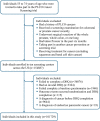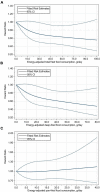Fried food consumption and the risk of pancreatic cancer: A large prospective multicenter study
- PMID: 35958255
- PMCID: PMC9362838
- DOI: 10.3389/fnut.2022.889303
Fried food consumption and the risk of pancreatic cancer: A large prospective multicenter study
Abstract
Background and aims: Whether fried food consumption is associated with the risk of pancreatic cancer remains elusive. We aimed to examine this association in a US population.
Methods: A population-based cohort of 101,729 US adults was identified. Fried food consumption was assessed with a validated food frequency questionnaire. Hazard ratios (HRs) with 95% confidence intervals (CIs) were calculated. Explanatory analyses were conducted to identify main contributor(s) to the observed association.
Results: During an average follow-up of 8.86 years (900871.2 person-years), 402 pancreatic cancer cases occurred. High consumption of total fried foods (deep-fried plus pan-fried foods; HRquartile4 vs. 1 0.71, 95% CI 0.51-0.99, P trend = 0.047) and deep-fried foods (HRquartile 4 vs. 1 0.64, 95% CI 0.47-0.88, P trend = 0.011), but not pan-fried foods (HRquartile 4 vs. 1 0.98, 95% CI 0.73-1.32; P trend = 0.815), was found to be associated with a reduced risk of pancreatic cancer in a non-linear dose-response manner, which was not modified by predefined stratification factors and persisted in sensitivity analyses. In explanatory analyses, only chip consumption was found to be inversely associated with the risk of pancreatic cancer; consistently, the initial significant associations between total fried food and deep-fried food consumption and the risk of pancreatic cancer changed to be non-significant after omitting or further adjusting for chip consumption.
Conclusion: Consumption of deep-fried foods, but not pan-fried foods, is inversely associated with the risk of pancreatic cancer in this US population. The role of deep-fried foods in reducing the risk of pancreatic cancer appears to be mainly attributable to chips. More studies are needed to confirm our findings in other populations and settings.
Keywords: chips; fried foods; nutritional epidemiology; pancreatic cancer; prospective study.
Copyright © 2022 Zhong, Zhu, Gong, Cai, Hu, Dai and Gong.
Conflict of interest statement
The authors declare that the research was conducted in the absence of any commercial or financial relationships that could be construed as a potential conflict of interest.
Figures




Similar articles
-
Consumption of fried foods and risk of heart failure in the physicians' health study.J Am Heart Assoc. 2015 Apr 23;4(4):e001740. doi: 10.1161/JAHA.114.001740. J Am Heart Assoc. 2015. PMID: 25907125 Free PMC article.
-
Ultra-processed food consumption and the risk of pancreatic cancer in the Prostate, Lung, Colorectal and Ovarian Cancer Screening Trial.Int J Cancer. 2023 Mar 1;152(5):835-844. doi: 10.1002/ijc.34290. Epub 2022 Oct 7. Int J Cancer. 2023. PMID: 36094042
-
Consumption of deep-fried foods and risk of prostate cancer.Prostate. 2013 Jun;73(9):960-9. doi: 10.1002/pros.22643. Epub 2013 Jan 17. Prostate. 2013. PMID: 23335051 Free PMC article.
-
Fried Food Consumption and Cardiovascular Health: A Review of Current Evidence.Nutrients. 2015 Oct 6;7(10):8424-30. doi: 10.3390/nu7105404. Nutrients. 2015. PMID: 26457715 Free PMC article. Review.
-
Potato consumption and risk of pancreatic cancer in the HELGA cohort.Br J Nutr. 2018 Jun;119(12):1408-1415. doi: 10.1017/S0007114518000788. Br J Nutr. 2018. PMID: 29845900 Free PMC article. Review.
Cited by
-
Association of Fried Food Intake with Gastric Cancer Risk: A Systemic Review and Meta-Analysis of Case-Control Studies.Nutrients. 2023 Jun 30;15(13):2982. doi: 10.3390/nu15132982. Nutrients. 2023. PMID: 37447308 Free PMC article.
References
-
- Dobarganes C, Márquez-Ruiz G. Possible adverse effects of frying with vegetable oils. Br J Nutr. (2015) 113(Suppl. 2):S49–57. - PubMed
-
- Uzcudun AE, Retolaza IR, Fernández PB, Sánchez Hernández JJ, Grande AG, García AG, et al. Nutrition and pharyngeal cancer: results from a case-control study in Spain. Head Neck. (2002) 24:830–40. - PubMed
-
- Jain K, Sreenivas V, Velpandian T, Kapil U, Garg PK. Risk factors for gallbladder cancer: a case-control study. Int J Cancer. (2013) 132:1660–6. - PubMed
LinkOut - more resources
Full Text Sources

